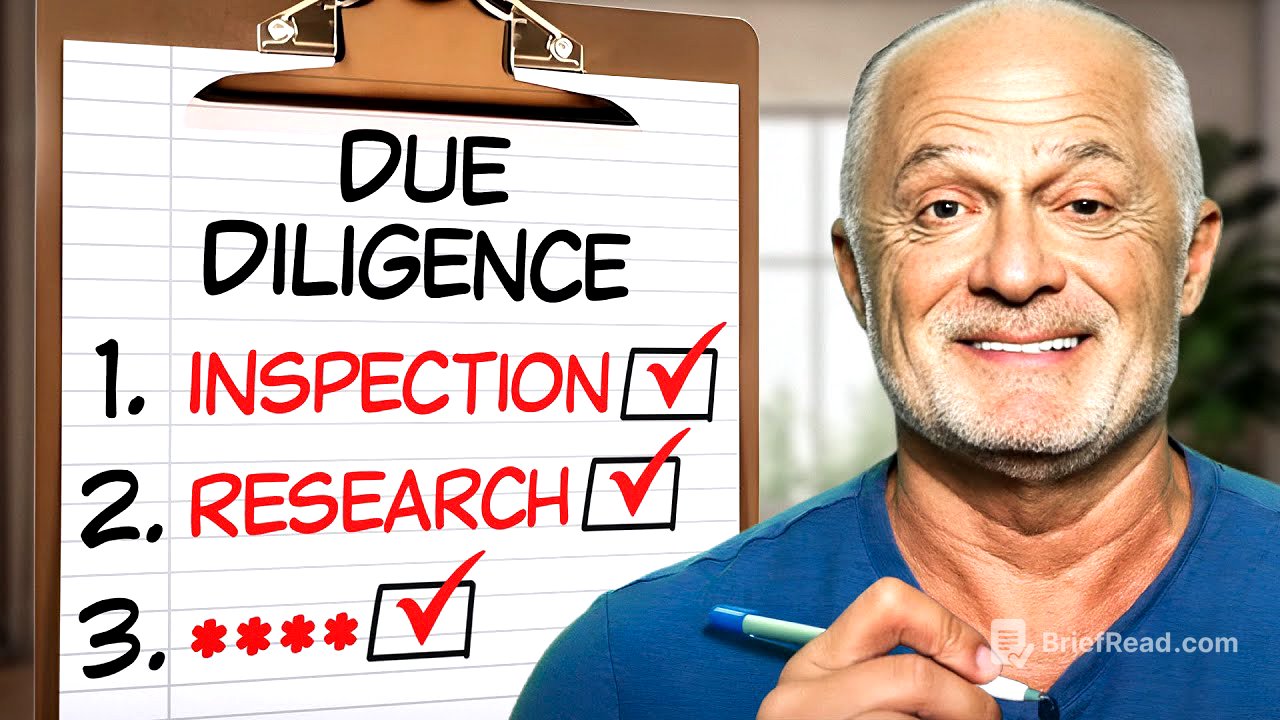TLDR;
This video emphasizes the importance of thorough due diligence in real estate investment to avoid costly mistakes. It covers various aspects of due diligence, including market analysis, neighborhood assessment, property inspection, financial review, and tenant interviews. The video also highlights the need to re-trade or walk away from deals if significant issues are discovered.
- Comprehensive due diligence is crucial to avoid mistakes in real estate investment.
- Key steps include market analysis, neighborhood assessment, property inspection, financial review, and tenant interviews.
- It's important to re-trade or walk away from deals if significant issues are discovered.
Comprehensive Due Diligence Checklist [0:07]
A comprehensive due diligence checklist is essential for real estate investment. It involves looking under every stone and making all necessary phone calls, including contacting county offices. This thoroughness helps prevent mistakes by combining empirical data with detailed investigation.
Chamber of Commerce and Economic Development Office [0:32]
Contacting the Chamber of Commerce and economic development offices is crucial to gather information about the market. This includes identifying businesses moving in and out, understanding incentives for investing such as grants and tax rebates, and learning about new major employers. This information should ideally be gathered before making offers, as part of an area presentation to inform investment decisions.
Neighborhood Analysis [1:27]
Analyzing the neighborhood involves physically driving through it to assess its livability, job opportunities, and amenities. Key considerations include the proximity of grocery stores, the quality of schools, and the availability of recreation and public transportation. Safety is also a critical factor, which can be evaluated by visiting the area at night and using resources like spot crime to compare crime rates with your own neighborhood.
Contacting the Police and Prioritizing Safety [3:01]
Contacting the non-emergency police number to inquire about past problems at the property is a very effective way to assess safety. Ensuring clear lines of sight, adequate lighting, and secure perimeters with cameras, gates, and fencing are essential for maintaining a safe environment, especially in C or B areas. Prioritizing clean, safe, and affordable living conditions is key to attracting and retaining tenants.
City Planning and Zoning [4:36]
Contacting city planning and zoning departments is important to identify any violations on the property, such as sewer backups, and to inquire about permits pulled for corrections like fire damage. It's also crucial to ask about upcoming zoning changes or infrastructure projects, such as new sewer lines, that could impact the property financially.
Contractors' Insights [5:37]
Talking to contractors who have worked on the property, including plumbers, electricians, and HVAC technicians, provides valuable insights into typical problems, infrastructure quality, and potential deferred maintenance. It's beneficial to ask what they would repair or replace if they owned the property. Additionally, getting fresh eyes by consulting new contractors can help ensure nothing is missed.
Potential Issues: Mold, Lead-Based Paint, and Asbestos [7:11]
When encountering mold, it's crucial to identify the cause before attempting mitigation. Common causes include leaking AC lines or negative drainage. Lead-based paint, common in pre-1978 properties, requires a lead-based paint addendum in the lease and can be managed by scraping, vacuuming, and painting. Asbestos should only be handled by professional removal.
Tenant Interviews [9:20]
Talking to tenants is invaluable to learn about their living experience. Ask if they like living there, if it's quiet and safe, and if they plan to stay. Pretending to be a prospective tenant can encourage them to open up. A real example is provided where a tenant revealed flooding issues that were not disclosed, leading to a price renegotiation, although the deal was ultimately regretted.
Building Inspectors and Unit Inspections [11:18]
Always use a building inspector or contractor and hire experts to check specific issues like roofing, HVAC, plumbing, electrical, and foundations. Physically walk every unit, videoing or taking pictures of everything inside, including appliances, counters, and HVAC closets. For larger assets, property management companies can provide teams to assist with this process, rating the condition of each unit.
Financial Inspection Process [13:05]
The financial inspection process involves verifying the rent roll and profit and loss (P&L) statements for consistency. Inconsistencies may require reviewing bank statements. A lease audit, often performed by the management company, ensures the rent roll matches the leases. Utility bills should also be checked to match the P&L and expense lines. Reviewing contracts with vendors like landscapers and pool services is also essential.
Retrading and Walking Away [14:51]
If due diligence reveals undisclosed or misrepresented information, or if new issues are discovered, it's important to retrade, which means renegotiate the deal. Don't be afraid to walk away if necessary, as sometimes the best deals are the ones you don't do. A bad first experience can be avoided by doing thorough homework.
Warrior Mentorship Program [15:31]
The Warrior mentorship program is designed to help individuals escape the rat race and achieve financial and time freedom through real estate investment. The program provides a proven framework, systems, and a network to raise money, find deals, and build partnerships. Those interested can apply by texting "crush" to 72345 or visiting mentorwithrod.com.




![Let’s Start a $373/day Business Together Live [Replay]](https://wm-img.halpindev.com/p-briefread_c-10_b-10/urlb/aHR0cDovL2ltZy55b3V0dWJlLmNvbS92aS9XQm5yNENTT0h5Yy9ocWRlZmF1bHQuanBn.jpg)




